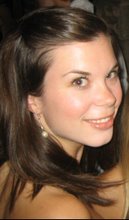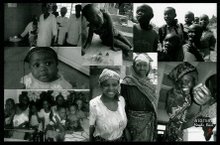On Wednesday morning (the 24th), I woke up and prepared the English lesson for the afternoon while we waited for our friend Lawreen (a Mary-Knoll lay-volunteer) to show up so that we could escort her to our tailor in town. The tailor is in high demand as we approach Mwanza’s annual Charity Ball in mid-November and we all realize that we did not think to pack for a semi-formal event. From the tailor, we stopped by a souvenir shop that sells carvings, as well as the Maasai market so that Doug could pick up some gifts for home. Alison and I had passport photos taken for our visa renewal (“If you actually look like your passport photo, you aren’t well enough to travel.” – Sir Vivian Fuchs), and then for lunch at the MDBI Eating Point, the cheap & traditional restaurant that Alison and I love. We felt energetic enough afterwards to take Doug to the city market to negotiate for the purchase of a few traditional Maasai blankets. We finally returned home in time to do some work on our laptops before walking to Mabatini to teach the day’s English lesson. I carried up several more pairs of reading glasses to the delight of the mamas… they are thrilled with them and wanted me to pass their appreciation on to my mother.
Sabina, myself, Paskwalina, and Alison modelling new reading glasses (tags still attached).
We came home from Mabatini after a couple hours and ran into some commotion in Mlango Mmoja – the police were arresting someone and there was a rowdy crowd watching the action. The police fired a few warning shots from an air gun into the sky… no real danger but still a bit of a surprise to see on the way home. Around the corner, we ran into a street performance from the same theatre group that we had watched with the faculty. They recognized us, and Alison took the full brunt of their excitement as one of the traditional dancers performed his wild dance at her feet. From home, we took a cab to the Tanzania Breweries for a very quick repeat tour – we were trying to ensure that Doug saw as much as possible during his time here! After our tour, we were invited to the company pub with Lucas (a head brewer and one of our industry contacts), where each employee gets a free beer or
two after their shift. From the brewery, we decided to walk to Tunza Lodge for dinner to introduce Doug to some of our friends. Ruben joined us by taking a motorcycle taxi from home – something that Alison and I have not been brave enough to attempt yet. We had a long talk over dinner about being swindled by locals who associate mzungus with money and will not hesitate to triple their prices for you. Jan’s (Tunza’s owner) theory is a good one – don’t put up with dishonesty and be consistent if you want to be respected in the long run. I received a text from Beatrice in Dar during dinner, informing me that the Hon. Salome Mbatia (the Deputy Minister who visited our project in August) had been killed in a road accident when a timber truck hit her vehicle head on. After having been in contact with her office just last week to arrange a meeting with the Danone consultant, it was very hard to see how life can change in an instant. We were very sad to hear the news… she was truly a wonderful woman who worked extremely hard for the betterment of her country.
Sikitu and her grandmother on Bugando Hill.
I spent an early couple of hours on Thursday morning (the 25th) drafting emails to friends and family to save to my USB disk and send out at the internet café later in the day. Later, Alison and I worked for a while on the marketing package that we will distribute to hotels and restaurants in Mwanza to promote the mamas’ product. We waited for Pendo (our housekeeper) to arrive and take us up Bugando Hill (the unplanned slum near our house) to find the home of a girl named Sikitu. Sikitu was orphaned by HIV/AIDS and contracted the disease while caring for her mother. She and her grandmother (who has lost 3 children to the disease) live together in a house that Kivulini helped them construct. Dallas Curow, a former WHE intern, fundraised at home to support Sikitu’s family and asked that a gift be passed on to them. It was wonderful to be a part of something so life-changing for a struggling family in Mwanza. From Bugando Hill, Alison, Doug and I went to most of the internet cafés in town before finding one that (kind of) worked. Afterwards, we sent Doug home and walked to our Swahili class. On the way, we saw a woman who was half dressed, crying and holding her head as she walked down the street. There were quite a number of people on the street at the time, but she didn’t seem to see any of them. Alison and I felt very torn, as we wanted to help but knew that with our limited grasp of Swahili, we wouldn’t be completely effective. We arrived at class feeling very shaken up and useless… not one of our finer moments in Mwanza. After class, we went to Tunza for yoga, dinner, and a relaxing campfire on the beach.
Sharing a laugh with Gracie at Forever Angels.
On Friday morning (the 26th), I woke up early to write the day’s English test before we were expected at Sekou Toure hospital (where Ruben is conducting his study) for a tour of the facility by the matron. I had expected the hospital to be a bit more “Race Against Time”-esque, with 3 people to a bed and others on the floor, but that wasn’t the case. We were taken through admissions, the dental and eye clinics, the CTC centre (treatment for those with HIV/AIDS), the pediatric ward, and the operating theatre. Nothing was really functioning as the power was out in the city and the hospital does not have back-up generators (but they do own and use ventilators… not a good investment, if you ask me). It was very interesting to see the reality and challenges of an urban hospital in Africa. Doug, Alison and I stopped at home to do some work before heading to Mabatini, and onwards to the orphanage in Bwiru. On Friday evening, we hosted a couple friends for dinner (finally, a successful attempt at ugali!) before going out to the Tilapia Hotel for an early Halloween party.
On Saturday morning, Doug, Alison and I met one of Pendo’s daughters and followed her to their family home. We met Pendo’s eight children and sat for a while in their living room/bedroom, reading English workbooks and looking at pictures, while Alison accompanied some of Pendo’s sons to the market to pick up food for lunch. We set off together with the family to the dala-dala station at the market in town to travel to Nyasaka, where Pendo’s mother lives. Doug had a very intense first dala-dala experience as I counted 26 people and 4 chickens squished into a vehicle the size of a VW van. After the 25 minute ride through the area, we got out and walked another 15 minutes – such an abundance of sights and sounds (i.e. almost getting run over by a herd of goats running very fast downhill, boys playing at makeshift pool table using marbles and pencils as cues, and being led through the pathways by Pendo’s daughter who couldn’t be more than 10 years old, toting a massive bag of charcoal on her head). When we arrived, we were greeted by Pendo’s mother (Maimuna), a beautiful woman in black with lots of jewellery on (including a hoop in her nose). We all helped to prepare the meal, were taught how to weave straw to make decorative mats, and enjoyed the rowdy family atmosphere of the house. After we ate, the children helped to clean up both the dinner and the house itself as Pendo had her hair braided by her mother. We set out running for the dala-dala through a rainstorm, with the children stopping along the way to dance to loud music on a basketball court elevated above the grasses… I felt like I was in a movie! It was such a nice experience to be so welcomed into their family – we felt very lucky.
Pendo's family in Nyasaka.
On Saturday evening, we drove out to Igombe to spend a relaxing night camping by the lake. We met a friend of Major’s, Boni, who returned to Mwanza from his studies in the Netherlands for the funeral of his half-brother, who passed away at the age of 31 due to complications from HIV/AIDS. We had a great evening chatting with everyone around the fire with a full moon shining down on us.
On Sunday morning (the 28th), we packed up camp and drove back to town to drop Doug off at the airport for his flight to Dar es Salaam (and onwards to Zanzibar). We spent a relaxing day at Tunza, learning to wakeboard (so far Alison and I have been unsuccessful in getting up on the board but both feel like we’re just at the cusp of figuring it out!) and enjoying the warm African sun.
This coming week will be a busy one as we reorganize our project efforts before travelling to Zanzibar on Thursday morning (returning next Monday afternoon). Alison and I have been looking forward to this trip for quite some time and can’t wait to share our experience with everyone upon our return.
Tunza's vibrant flora.



































 A rugged dhow sailboat on Lake Victoria.
A rugged dhow sailboat on Lake Victoria.
